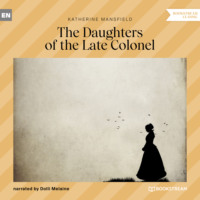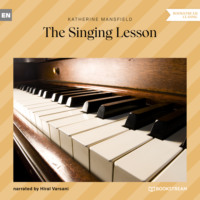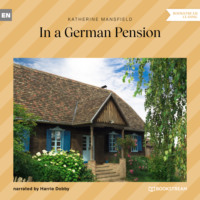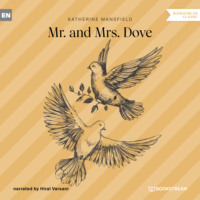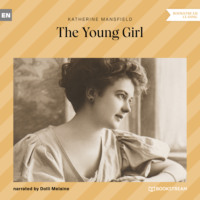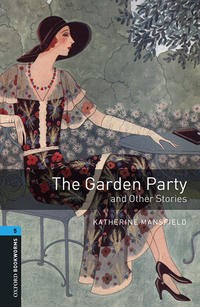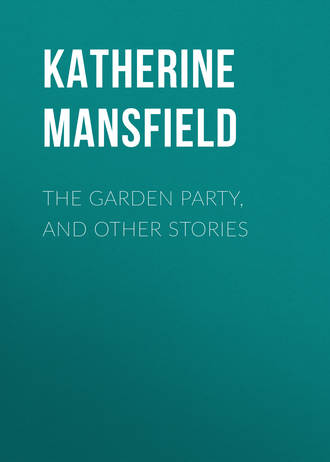 полная версия
полная версияThe Garden Party, and Other Stories
Mrs. Kember’s husband was at least ten years younger than she was, and so incredibly handsome that he looked like a mask or a most perfect illustration in an American novel rather than a man. Black hair, dark blue eyes, red lips, a slow sleepy smile, a fine tennis player, a perfect dancer, and with it all a mystery. Harry Kember was like a man walking in his sleep. Men couldn’t stand him, they couldn’t get a word out of the chap; he ignored his wife just as she ignored him. How did he live? Of course there were stories, but such stories! They simply couldn’t be told. The women he’d been seen with, the places he’d been seen in… but nothing was ever certain, nothing definite. Some of the women at the Bay privately thought he’d commit a murder one day. Yes, even while they talked to Mrs. Kember and took in the awful concoction she was wearing, they saw her, stretched as she lay on the beach; but cold, bloody, and still with a cigarette stuck in the corner of her mouth.
Mrs. Kember rose, yawned, unsnapped her belt buckle, and tugged at the tape of her blouse. And Beryl stepped out of her skirt and shed her jersey, and stood up in her short white petticoat, and her camisole with ribbon bows on the shoulders.
“Mercy on us,” said Mrs. Harry Kember, “what a little beauty you are!”
“Don’t!” said Beryl softly; but, drawing off one stocking and then the other, she felt a little beauty.
“My dear—why not?” said Mrs. Harry Kember, stamping on her own petticoat. Really—her underclothes! A pair of blue cotton knickers and a linen bodice that reminded one somehow of a pillow-case… “And you don’t wear stays, do you?” She touched Beryl’s waist, and Beryl sprang away with a small affected cry. Then “Never!” she said firmly.
“Lucky little creature,” sighed Mrs. Kember, unfastening her own.
Beryl turned her back and began the complicated movements of some one who is trying to take off her clothes and to pull on her bathing-dress all at one and the same time.
“Oh, my dear—don’t mind me,” said Mrs. Harry Kember. “Why be shy? I shan’t eat you. I shan’t be shocked like those other ninnies.” And she gave her strange neighing laugh and grimaced at the other women.
But Beryl was shy. She never undressed in front of anybody. Was that silly? Mrs. Harry Kember made her feel it was silly, even something to be ashamed of. Why be shy indeed! She glanced quickly at her friend standing so boldly in her torn chemise and lighting a fresh cigarette; and a quick, bold, evil feeling started up in her breast. Laughing recklessly, she drew on the limp, sandy-feeling bathing-dress that was not quite dry and fastened the twisted buttons.
“That’s better,” said Mrs. Harry Kember. They began to go down the beach together. “Really, it’s a sin for you to wear clothes, my dear. Somebody’s got to tell you some day.”
The water was quite warm. It was that marvellous transparent blue, flecked with silver, but the sand at the bottom looked gold; when you kicked with your toes there rose a little puff of gold-dust. Now the waves just reached her breast. Beryl stood, her arms outstretched, gazing out, and as each wave came she gave the slightest little jump, so that it seemed it was the wave which lifted her so gently.
“I believe in pretty girls having a good time,” said Mrs. Harry Kember. “Why not? Don’t you make a mistake, my dear. Enjoy yourself.” And suddenly she turned turtle, disappeared, and swam away quickly, quickly, like a rat. Then she flicked round and began swimming back. She was going to say something else. Beryl felt that she was being poisoned by this cold woman, but she longed to hear. But oh, how strange, how horrible! As Mrs. Harry Kember came up close she looked, in her black waterproof bathing-cap, with her sleepy face lifted above the water, just her chin touching, like a horrible caricature of her husband.
Chapter 1.VI
In a steamer chair, under a manuka tree that grew in the middle of the front grass patch, Linda Burnell dreamed the morning away. She did nothing. She looked up at the dark, close, dry leaves of the manuka, at the chinks of blue between, and now and again a tiny yellowish flower dropped on her. Pretty—yes, if you held one of those flowers on the palm of your hand and looked at it closely, it was an exquisite small thing. Each pale yellow petal shone as if each was the careful work of a loving hand. The tiny tongue in the centre gave it the shape of a bell. And when you turned it over the outside was a deep bronze colour. But as soon as they flowered, they fell and were scattered. You brushed them off your frock as you talked; the horrid little things got caught in one’s hair. Why, then, flower at all? Who takes the trouble—or the joy—to make all these things that are wasted, wasted… It was uncanny.
On the grass beside her, lying between two pillows, was the boy. Sound asleep he lay, his head turned away from his mother. His fine dark hair looked more like a shadow than like real hair, but his ear was a bright, deep coral. Linda clasped her hands above her head and crossed her feet. It was very pleasant to know that all these bungalows were empty, that everybody was down on the beach, out of sight, out of hearing. She had the garden to herself; she was alone.
Dazzling white the picotees shone; the golden-eyed marigold glittered; the nasturtiums wreathed the veranda poles in green and gold flame. If only one had time to look at these flowers long enough, time to get over the sense of novelty and strangeness, time to know them! But as soon as one paused to part the petals, to discover the under-side of the leaf, along came Life and one was swept away. And, lying in her cane chair, Linda felt so light; she felt like a leaf. Along came Life like a wind and she was seized and shaken; she had to go. Oh dear, would it always be so? Was there no escape?
… Now she sat on the veranda of their Tasmanian home, leaning against her father’s knee. And he promised, “As soon as you and I are old enough, Linny, we’ll cut off somewhere, we’ll escape. Two boys together. I have a fancy I’d like to sail up a river in China.” Linda saw that river, very wide, covered with little rafts and boats. She saw the yellow hats of the boatmen and she heard their high, thin voices as they called…
“Yes, papa.”
But just then a very broad young man with bright ginger hair walked slowly past their house, and slowly, solemnly even, uncovered. Linda’s father pulled her ear teasingly, in the way he had.
“Linny’s beau,” he whispered.
“Oh, papa, fancy being married to Stanley Burnell!”
Well, she was married to him. And what was more she loved him. Not the Stanley whom every one saw, not the everyday one; but a timid, sensitive, innocent Stanley who knelt down every night to say his prayers, and who longed to be good. Stanley was simple. If he believed in people—as he believed in her, for instance—it was with his whole heart. He could not be disloyal; he could not tell a lie. And how terribly he suffered if he thought any one—she—was not being dead straight, dead sincere with him! “This is too subtle for me!” He flung out the words, but his open, quivering, distraught look was like the look of a trapped beast.
But the trouble was—here Linda felt almost inclined to laugh, though Heaven knows it was no laughing matter—she saw her Stanley so seldom. There were glimpses, moments, breathing spaces of calm, but all the rest of the time it was like living in a house that couldn’t be cured of the habit of catching on fire, on a ship that got wrecked every day. And it was always Stanley who was in the thick of the danger. Her whole time was spent in rescuing him, and restoring him, and calming him down, and listening to his story. And what was left of her time was spent in the dread of having children.
Linda frowned; she sat up quickly in her steamer chair and clasped her ankles. Yes, that was her real grudge against life; that was what she could not understand. That was the question she asked and asked, and listened in vain for the answer. It was all very well to say it was the common lot of women to bear children. It wasn’t true. She, for one, could prove that wrong. She was broken, made weak, her courage was gone, through child-bearing. And what made it doubly hard to bear was, she did not love her children. It was useless pretending. Even if she had had the strength she never would have nursed and played with the little girls. No, it was as though a cold breath had chilled her through and through on each of those awful journeys; she had no warmth left to give them. As to the boy—well, thank Heaven, mother had taken him; he was mother’s, or Beryl’s, or anybody’s who wanted him. She had hardly held him in her arms. She was so indifferent about him that as he lay there… Linda glanced down.
The boy had turned over. He lay facing her, and he was no longer asleep. His dark-blue, baby eyes were open; he looked as though he was peeping at his mother. And suddenly his face dimpled; it broke into a wide, toothless smile, a perfect beam, no less.
“I’m here!” that happy smile seemed to say. “Why don’t you like me?”
There was something so quaint, so unexpected about that smile that Linda smiled herself. But she checked herself and said to the boy coldly, “I don’t like babies.”
“Don’t like babies?” The boy couldn’t believe her. “Don’t like me?” He waved his arms foolishly at his mother.
Linda dropped off her chair on to the grass.
“Why do you keep on smiling?” she said severely. “If you knew what I was thinking about, you wouldn’t.”
But he only squeezed up his eyes, slyly, and rolled his head on the pillow. He didn’t believe a word she said.
“We know all about that!” smiled the boy.
Linda was so astonished at the confidence of this little creature… Ah no, be sincere. That was not what she felt; it was something far different, it was something so new, so… The tears danced in her eyes; she breathed in a small whisper to the boy, “Hallo, my funny!”
But by now the boy had forgotten his mother. He was serious again. Something pink, something soft waved in front of him. He made a grab at it and it immediately disappeared. But when he lay back, another, like the first, appeared. This time he determined to catch it. He made a tremendous effort and rolled right over.
Chapter 1.VII
The tide was out; the beach was deserted; lazily flopped the warm sea. The sun beat down, beat down hot and fiery on the fine sand, baking the grey and blue and black and white-veined pebbles. It sucked up the little drop of water that lay in the hollow of the curved shells; it bleached the pink convolvulus that threaded through and through the sand-hills. Nothing seemed to move but the small sand-hoppers. Pit-pit-pit! They were never still.
Over there on the weed-hung rocks that looked at low tide like shaggy beasts come down to the water to drink, the sunlight seemed to spin like a silver coin dropped into each of the small rock pools. They danced, they quivered, and minute ripples laved the porous shores. Looking down, bending over, each pool was like a lake with pink and blue houses clustered on the shores; and oh! the vast mountainous country behind those houses—the ravines, the passes, the dangerous creeks and fearful tracks that led to the water’s edge. Underneath waved the sea-forest—pink thread-like trees, velvet anemones, and orange berry-spotted weeds. Now a stone on the bottom moved, rocked, and there was a glimpse of a black feeler; now a thread-like creature wavered by and was lost. Something was happening to the pink, waving trees; they were changing to a cold moonlight blue. And now there sounded the faintest “plop.” Who made that sound? What was going on down there? And how strong, how damp the seaweed smelt in the hot sun…
The green blinds were drawn in the bungalows of the summer colony. Over the verandas, prone on the paddock, flung over the fences, there were exhausted-looking bathing-dresses and rough striped towels. Each back window seemed to have a pair of sand-shoes on the sill and some lumps of rock or a bucket or a collection of pawa shells. The bush quivered in a haze of heat; the sandy road was empty except for the Trouts’ dog Snooker, who lay stretched in the very middle of it. His blue eye was turned up, his legs stuck out stiffly, and he gave an occasional desperate-sounding puff, as much as to say he had decided to make an end of it and was only waiting for some kind cart to come along.
“What are you looking at, my grandma? Why do you keep stopping and sort of staring at the wall?”
Kezia and her grandmother were taking their siesta together. The little girl, wearing only her short drawers and her under-bodice, her arms and legs bare, lay on one of the puffed-up pillows of her grandma’s bed, and the old woman, in a white ruffled dressing-gown, sat in a rocker at the window, with a long piece of pink knitting in her lap. This room that they shared, like the other rooms of the bungalow, was of light varnished wood and the floor was bare. The furniture was of the shabbiest, the simplest. The dressing-table, for instance, was a packing-case in a sprigged muslin petticoat, and the mirror above was very strange; it was as though a little piece of forked lightning was imprisoned in it. On the table there stood a jar of sea-pinks, pressed so tightly together they looked more like a velvet pincushion, and a special shell which Kezia had given her grandma for a pin-tray, and another even more special which she had thought would make a very nice place for a watch to curl up in.
“Tell me, grandma,” said Kezia.
The old woman sighed, whipped the wool twice round her thumb, and drew the bone needle through. She was casting on.
“I was thinking of your Uncle William, darling,” she said quietly.
“My Australian Uncle William?” said Kezia. She had another.
“Yes, of course.”
“The one I never saw?”
“That was the one.”
“Well, what happened to him?” Kezia knew perfectly well, but she wanted to be told again.
“He went to the mines, and he got a sunstroke there and died,” said old Mrs. Fairfield.
Kezia blinked and considered the picture again… a little man fallen over like a tin soldier by the side of a big black hole.
“Does it make you sad to think about him, grandma?” She hated her grandma to be sad.
It was the old woman’s turn to consider. Did it make her sad? To look back, back. To stare down the years, as Kezia had seen her doing. To look after them as a woman does, long after they were out of sight. Did it make her sad? No, life was like that.
“No, Kezia.”
“But why?” asked Kezia. She lifted one bare arm and began to draw things in the air. “Why did Uncle William have to die? He wasn’t old.”
Mrs. Fairfield began counting the stitches in threes. “It just happened,” she said in an absorbed voice.
“Does everybody have to die?” asked Kezia.
“Everybody!”
“Me?” Kezia sounded fearfully incredulous.
“Some day, my darling.”
“But, grandma.” Kezia waved her left leg and waggled the toes. They felt sandy. “What if I just won’t?”
The old woman sighed again and drew a long thread from the ball.
“We’re not asked, Kezia,” she said sadly. “It happens to all of us sooner or later.”
Kezia lay still thinking this over. She didn’t want to die. It meant she would have to leave here, leave everywhere, for ever, leave—leave her grandma. She rolled over quickly.
“Grandma,” she said in a startled voice.
“What, my pet!”
“You’re not to die.” Kezia was very decided.
“Ah, Kezia”—her grandma looked up and smiled and shook her head—“don’t let’s talk about it.”
“But you’re not to. You couldn’t leave me. You couldn’t not be there.” This was awful. “Promise me you won’t ever do it, grandma,” pleaded Kezia.
The old woman went on knitting.
“Promise me! Say never!”
But still her grandma was silent.
Kezia rolled off her bed; she couldn’t bear it any longer, and lightly she leapt on to her grandma’s knees, clasped her hands round the old woman’s throat and began kissing her, under the chin, behind the ear, and blowing down her neck.
“Say never… say never… say never—” She gasped between the kisses. And then she began, very softly and lightly, to tickle her grandma.
“Kezia!” The old woman dropped her knitting. She swung back in the rocker. She began to tickle Kezia. “Say never, say never, say never,” gurgled Kezia, while they lay there laughing in each other’s arms. “Come, that’s enough, my squirrel! That’s enough, my wild pony!” said old Mrs. Fairfield, setting her cap straight. “Pick up my knitting.”
Both of them had forgotten what the “never” was about.
Chapter 1.VIII
The sun was still full on the garden when the back door of the Burnells’ shut with a bang, and a very gay figure walked down the path to the gate. It was Alice, the servant-girl, dressed for her afternoon out. She wore a white cotton dress with such large red spots on it and so many that they made you shudder, white shoes and a leghorn turned up under the brim with poppies. Of course she wore gloves, white ones, stained at the fastenings with iron-mould, and in one hand she carried a very dashed-looking sunshade which she referred to as her “perishall.”
Beryl, sitting in the window, fanning her freshly-washed hair, thought she had never seen such a guy. If Alice had only blacked her face with a piece of cork before she started out, the picture would have been complete. And where did a girl like that go to in a place like this? The heart-shaped Fijian fan beat scornfully at that lovely bright mane. She supposed Alice had picked up some horrible common larrikin and they’d go off into the bush together. Pity to have made herself so conspicuous; they’d have hard work to hide with Alice in that rig-out.
But no, Beryl was unfair. Alice was going to tea with Mrs Stubbs, who’d sent her an “invite” by the little boy who called for orders. She had taken ever such a liking to Mrs. Stubbs ever since the first time she went to the shop to get something for her mosquitoes.
“Dear heart!” Mrs. Stubbs had clapped her hand to her side. “I never seen anyone so eaten. You might have been attacked by canningbals.”
Alice did wish there’d been a bit of life on the road though. Made her feel so queer, having nobody behind her. Made her feel all weak in the spine. She couldn’t believe that some one wasn’t watching her. And yet it was silly to turn round; it gave you away. She pulled up her gloves, hummed to herself and said to the distant gum-tree, “Shan’t be long now.” But that was hardly company.
Mrs. Stubbs’s shop was perched on a little hillock just off the road. It had two big windows for eyes, a broad veranda for a hat, and the sign on the roof, scrawled MRS. STUBBS’S, was like a little card stuck rakishly in the hat crown.
On the veranda there hung a long string of bathing-dresses, clinging together as though they’d just been rescued from the sea rather than waiting to go in, and beside them there hung a cluster of sandshoes so extraordinarily mixed that to get at one pair you had to tear apart and forcibly separate at least fifty. Even then it was the rarest thing to find the left that belonged to the right. So many people had lost patience and gone off with one shoe that fitted and one that was a little too big… Mrs. Stubbs prided herself on keeping something of everything. The two windows, arranged in the form of precarious pyramids, were crammed so tight, piled so high, that it seemed only a conjurer could prevent them from toppling over. In the left-hand corner of one window, glued to the pane by four gelatine lozenges, there was—and there had been from time immemorial—a notice.
LOST! HANSOME GOLE BROOCH SOLID GOLD ON OR NEAR BEACH REWARD OFFERED
Alice pressed open the door. The bell jangled, the red serge curtains parted, and Mrs. Stubbs appeared. With her broad smile and the long bacon knife in her hand, she looked like a friendly brigand. Alice was welcomed so warmly that she found it quite difficult to keep up her “manners.” They consisted of persistent little coughs and hems, pulls at her gloves, tweaks at her skirt, and a curious difficulty in seeing what was set before her or understanding what was said.
Tea was laid on the parlour table—ham, sardines, a whole pound of butter, and such a large johnny cake that it looked like an advertisement for somebody’s baking-powder. But the Primus stove roared so loudly that it was useless to try to talk above it. Alice sat down on the edge of a basket-chair while Mrs. Stubbs pumped the stove still higher. Suddenly Mrs. Stubbs whipped the cushion off a chair and disclosed a large brown-paper parcel.
“I’ve just had some new photers taken, my dear,” she shouted cheerfully to Alice. “Tell me what you think of them.”
In a very dainty, refined way Alice wet her finger and put the tissue back from the first one. Life! How many there were! There were three dozzing at least. And she held it up to the light.
Mrs. Stubbs sat in an arm-chair, leaning very much to one side. There was a look of mild astonishment on her large face, and well there might be. For though the arm-chair stood on a carpet, to the left of it, miraculously skirting the carpet-border, there was a dashing water-fall. On her right stood a Grecian pillar with a giant fern-tree on either side of it, and in the background towered a gaunt mountain, pale with snow.
“It is a nice style, isn’t it?” shouted Mrs. Stubbs; and Alice had just screamed “Sweetly” when the roaring of the Primus stove died down, fizzled out, ceased, and she said “Pretty” in a silence that was frightening.
“Draw up your chair, my dear,” said Mrs. Stubbs, beginning to pour out. “Yes,” she said thoughtfully, as she handed the tea, “but I don’t care about the size. I’m having an enlargemint. All very well for Christmas cards, but I never was the one for small photers myself. You get no comfort out of them. To say the truth, I find them dis’eartening.”
Alice quite saw what she meant.
“Size,” said Mrs. Stubbs. “Give me size. That was what my poor dear husband was always saying. He couldn’t stand anything small. Gave him the creeps. And, strange as it may seem, my dear”—here Mrs. Stubbs creaked and seemed to expand herself at the memory—“it was dropsy that carried him off at the larst. Many’s the time they drawn one and a half pints from ‘im at the ‘ospital… It seemed like a judgmint.”
Alice burned to know exactly what it was that was drawn from him. She ventured, “I suppose it was water.”
But Mrs. Stubbs fixed Alice with her eyes and replied meaningly, “It was liquid, my dear.”
Liquid! Alice jumped away from the word like a cat and came back to it, nosing and wary.
“That’s ‘im!” said Mrs. Stubbs, and she pointed dramatically to the life-size head and shoulders of a burly man with a dead white rose in the buttonhole of his coat that made you think of a curl of cold mutting fat. Just below, in silver letters on a red cardboard ground, were the words, “Be not afraid, it is I.”
“It’s ever such a fine face,” said Alice faintly.
The pale-blue bow on the top of Mrs. Stubbs’s fair frizzy hair quivered. She arched her plump neck. What a neck she had! It was bright pink where it began and then it changed to warm apricot, and that faded to the colour of a brown egg and then to a deep creamy.
“All the same, my dear,” she said surprisingly, “freedom’s best!” Her soft, fat chuckle sounded like a purr. “Freedom’s best,” said Mrs. Stubbs again.
Freedom! Alice gave a loud, silly little titter. She felt awkward. Her mind flew back to her own kitching. Ever so queer! She wanted to be back in it again.
Chapter 1.IX
A strange company assembled in the Burnells’ washhouse after tea. Round the table there sat a bull, a rooster, a donkey that kept forgetting it was a donkey, a sheep and a bee. The washhouse was the perfect place for such a meeting because they could make as much noise as they liked, and nobody ever interrupted. It was a small tin shed standing apart from the bungalow. Against the wall there was a deep trough and in the corner a copper with a basket of clothes-pegs on top of it. The little window, spun over with cobwebs, had a piece of candle and a mouse-trap on the dusty sill. There were clotheslines criss-crossed overhead and, hanging from a peg on the wall, a very big, a huge, rusty horseshoe. The table was in the middle with a form at either side.


